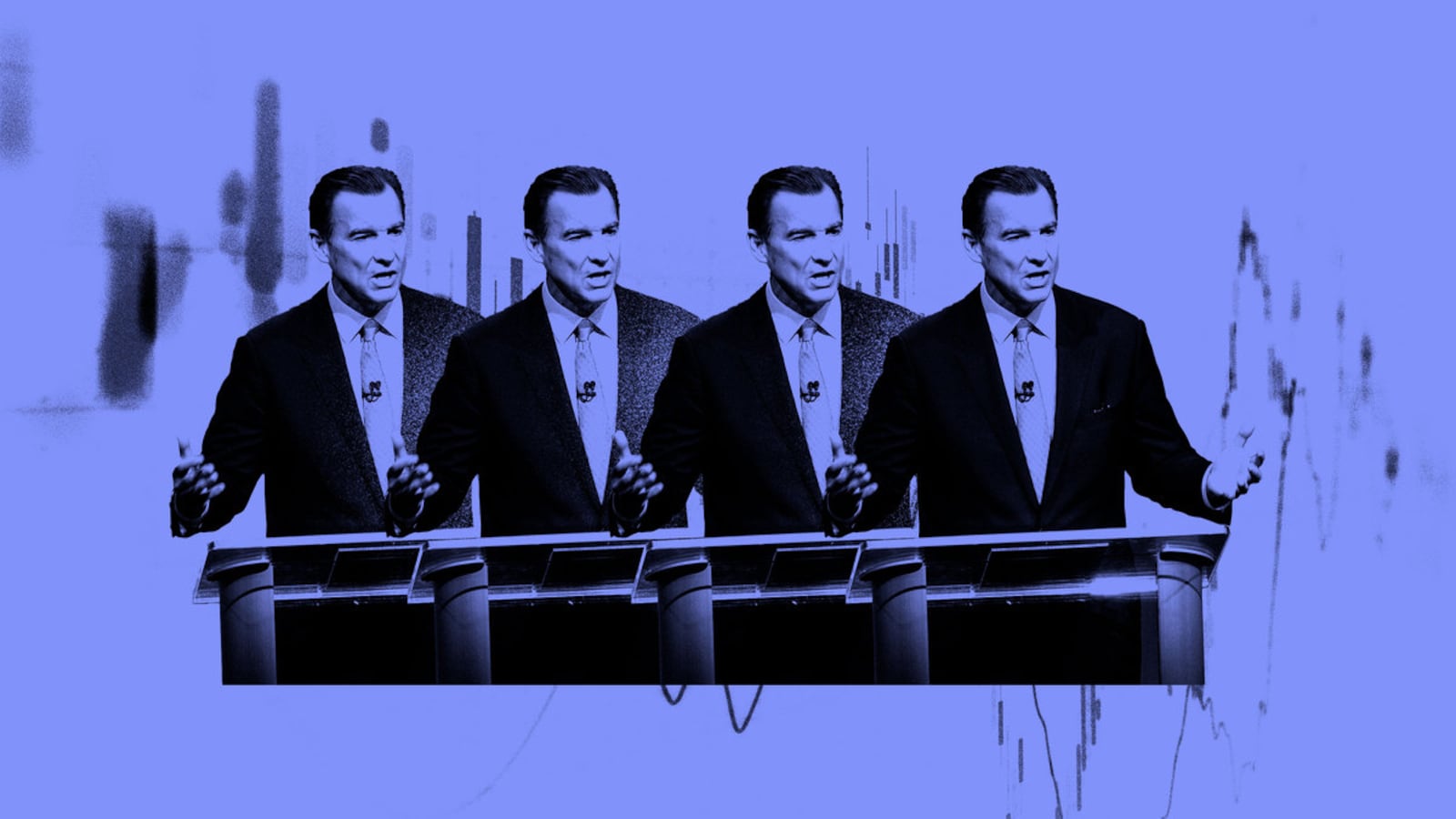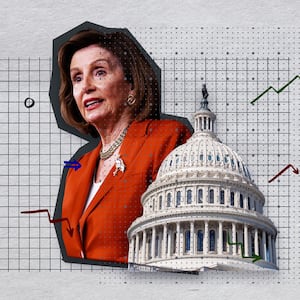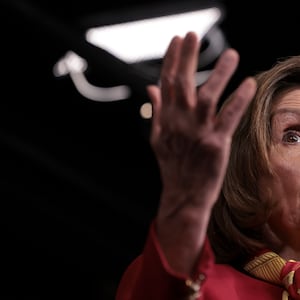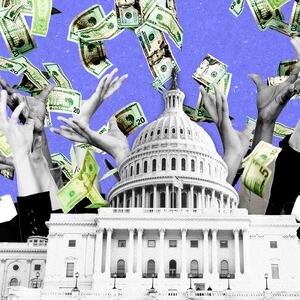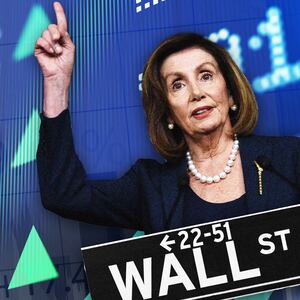When Rep. Tom Suozzi (D-NY) came before congressional investigators earlier this year to explain why he hadn’t disclosed hundreds of stock trades in a timely manner, the Long Island congressman currently running for governor had quite the explanation.
Suozzi actually told investigators he was too busy to deal with the “formality” of reporting hundreds of trades—and actually pinned the blame on the ethics office for not sending him constant reminders or issuing him a dedicated staffer devoted to compliance.
“Quite frankly, we have a lot going on in Congress. I have a lot of other stuff going on. And it’s just not—ethics is a big priority for me. But… the… some of the formalities are not necessarily something I make a priority of,” the congressman said, according to a deposition transcript.
Besides, he hired someone else to trade stocks for him, so he didn’t believe he needed to report every time he bought and sold shares of dozens of corporations.
“I was under the impression that because I had [broker-directed] accounts that they traded at their discretion, that my requirement was to fill out an annual disclosure. And I did fill out an annual disclosure every year,” he told congressional investigators this year.
In his deposition, Suozzi told investigators he left the trading to an independent stock broker, which—he believed—somehow excused him from the requirement of showing when he bought or sold stock.
For example, when Suozzi’s stockbroker purchased more than $50,000 of Tesla stock in March 2021—and when the broker sold the very next month, just as fellow congressmen began to raise concerns over the car company’s autopilot feature—Suozzi was obligated to disclose that information within 45 days. He didn’t.
Suozzi was one of three congressmen who were let off the hook last week when the House Ethics Committee—notorious for not taking action in all but the most egregious violations—chalked up their failure to report stock trades as innocent mistakes.
In a statement on July 29, the bipartisan Ethics Committee officially declared that “there was not clear evidence that the errors and omissions… were knowing or willful, and that the members were generally unclear on the requirements.”
When it actually published investigative documents three days later, it became clear that Suozzi remained defiant when he was forced to face his mistakes earlier this year—and offered some novel defenses.
During a virtual sit down with House ethics lawyers on Jan. 12, attorney Omar Ashmawy asked the congressman whether changes could be made to help politicians file their disclosures when they’re supposed to.
Suozzi suggested each member of Congress should have their own ethics adviser.
“Well, I think that, you know, there is [sic] only 435 members of Congress,” Suozzi replied. “And so I think that every single member of Congress should have someone from the Ethics Office that is responsible for that member. So like everybody has got their staff member. And that staff member should be, you know, responsible for saying, ‘Hey, you know, you didn’t take your class, you didn’t file your reports, you didn’t do this, you didn’t do that.’”
That didn’t sit well with former House ethics lawyer Kedric Payne at the Campaign Legal Center, a watchdog nonprofit that first called out Suozzi for the total lack of stock trading transparency spanning five years.
“His explanation just doesn’t pass the smell test. This is the most straightforward rule. Report your stock trades,” Payne told The Daily Beast.
The current rules require that any politician in Congress—and some employees—report any stock trade valued over $1,000 within 45 days. But Suozzi, like so many others in Congress, totally neglected the rules.
It wasn’t until Sept. 22, 2021, when the Campaign Legal Center called him out—as well as six other members of Congress—that Suozzi took notice. The very next day, he filed a “periodic transaction report,” a gargantuan 50-page accounting of more than 400 stock trades dating back to his very first week in Congress four years earlier.
“Do you see how quick he could do it?” asked Payne. “He didn’t have time to report, but he does make a priority of trading that much stock.”
The records show constant buying and selling of dozens of different types of stocks, from car makers like Ford and General Motors to chipmakers like AMD and NVIDIA.
Suozzi’s office did not reply to a request for comment on Friday.
In his deposition with investigators, the congressman maintained that he thought it was enough to file year-end reports reflecting his investment portfolio. While those year-end reports reflect what stocks a politician owns overall, they don’t show the many purchases and sales that occur throughout the year, nor do they always indicate when a member bought or sold stock.
The congressman was called out publicly by the Campaign Legal Center after an exhaustive search by a researcher there, Sophia Gonsalves-Brown, who examined every member of Congress and compared year-over-year disclosures to spot when some stocks seemed to disappear. The nonprofit then filed a formal complaint with the Office of Congressional Ethics, which anyone can do by filling out a form.
Last week, that complaint fizzled out, however, when the House Ethics Committee passed on any formal reprimands of Suozzi and two others who failed to file reports on time: Rep. Pat Fallon (R-TX) and Rep. Chris Jacobs (R-NY).
The Daily Beast attempted to review what excuses they had for not filing reports, but depositions weren’t available for either congressman. According to committee staff, Congressman Fallon “chose not to cooperate, thus no deposition.” Meanwhile, any official interview of Jacobs is not publicly available because the ethics board, which is separate from the committee and led by former congressman Mike Barnes, was deadlocked on whether or not to proceed with the investigation. The House of Representatives is not subject to public records laws.
The congressional offices of Fallon and Jacobs did not respond to requests for comment.
These politicians’ STOCK ACT violations come at a decisive time, when the law is under scrutiny for not going far enough to ensure that politicians aren’t abusing their positions of power to personally enrich themselves with the sensitive information they receive as members of Congress.
Sen. Jon Ossoff (D-GA) has called for totally banning members of Congress from trading stocks. And others have joined the fight to stop politicians from personally profiting, especially because so many of them get away with it. For example, the Justice Department eventually dropped its investigation into how Sen. Richard Burr (R-NC) sold up to $1.7 million of stock after personally reassuring the American public that the country was prepared to deal with the COVID-19 pandemic.
At this point, there are several House and Senate bills aiming to restrict politicians from trading stock in one way or another. But none has received a vote, though Democrats are quietly trying to force Speaker Nancy Pelosi (D-CA) to move forward on a consensus bill.
Still, the lack of action has led The New York Times editorial board to say “members of Congress should not be trading stocks, ever,” and Insider has launched its own tool, called “Conflicted Congress,” to track the lack of transparency.
Meanwhile, the House ethics committee is undergoing some turmoil. The ranking Republican, Rep. Jackie Walorski (R-IN), died in a two-car crash back in her home state on Wednesday.

